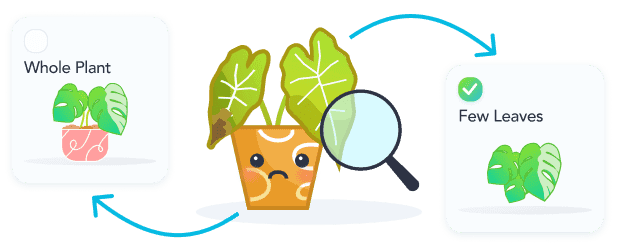Every 7d
Recommended Frequency
1 /2 cup of water
Recommended Amount
Make sure to keep your Weeping Fig Tree's soil moist but not soggy. Allowing water to pool in the pot and stay stagnant will cause root rot. Be sure to be consistent with your watering schedule, as these plants are sensi...
Every 30d
Recommended Frequency
Fertilize your Weeping Fig Tree once a month during spring and summer using a liquid fertilizer. Do not fertilize in autumn and winter.
Indirect Sun
Recommended
Indirect Sun or Filtered Sun is when sun exposure is being filtered through a sheer curtain or is not able to have the sun's rays directly hit the leaves/flowers of your plant.
For a weeping fig tree, maintaining an environment with a temperature between 75 to 85 degrees Fahrenheit is crucial for its health and growth. This range is considered to be on the higher side, ensuring the plant thrive...
Sandy Soil
Recommended Soil
Peat Soil is an acidic soil that retains a lot of moisture and slows decomposition. Due to such a high moisture retention this mix may require irrigation to help with draining. This soil type is best used when paired wit...
For a weeping fig tree, maintaining a humidity level around 40-80% is beneficial. This range supports its growth and health, aligning with its natural tropical habitat. Ensure the environment is not too dry to meet its n...

Shop Weeping Fig Tree
Questions about Weeping Fig Tree
A weeping fig tree plant, scientifically known as Ficus benjamina, is a popular indoor plant known for its elegant growth and glossy, slender leaves that gracefully droop down, creating a weeping effect. It's a durable s...

Toxicity of Weeping Fig Tree

Common Pests and Diseases
Root Rot
Overwatering
To address root rot, first, allow the soil to dry out by reducing your watering frequency. If the condition is severe, remove the plant from its pot, trim away any black, mushy roots, then repot in fresh, well-draining soil. Ensure the pot has adequate drainage holes. Moving forward, water the weeping fig only when the top inch of soil feels dry to the touch, and avoid letting the pot sit in standing water.
Leaf Drop
Underwatering
To address leaf drop due to underwatering, establish a consistent watering schedule, ensuring the soil is kept evenly moist but not waterlogged. Check the soil moisture by inserting your finger about an inch deep; if it feels dry, it's time to water. During the growing season, water more frequently, reducing the amount in winter. If the soil has been dry for an extended period, immerse the pot in water for about an hour, then allow it to drain thoroughly.
Ficus Leaf Drop
Caused by pests such as spider mites and scale insects. These pests suck sap from the leaves, stressing the plant and leading to leaf drop.
To combat these pests, start by isolating the affected plant to prevent the spread to others. Regularly wipe the leaves with a damp cloth to remove dust and pests. For a natural remedy, use neem oil or a mild soap solution to spray the plant, focusing on the undersides of the leaves where pests often reside. In severe cases, consider using insecticidal soap or horticultural oil, following the product's instructions carefully. Ensure the plant is not under water stress, as healthy plants are more resistant to pests.
Leaf Drop
Environmental Stress
Weeping figs are sensitive to changes in their environment, such as shifts in temperature, light, and drafts. To mitigate leaf drop, maintain a stable environment with consistent, indirect light and avoid placing your plant in the path of sudden temperature changes or drafts. Gradually acclimate your plant to any new locations within the home to reduce stress and minimize leaf drop.

Related Plants
Other Articles:
Top 10 Most Popular Roses
Mar 22, 2022
How to Care for China Roses
Mar 11, 2022
How to Care for Chinese Money Plants
May 15, 2020
How to Grow and Care for A Bird of Paradise
Apr 26, 2020
Top 10 Plants To Grow In A Terrarium
May 31, 2022
How to Grow and Care for Lucky Bamboo
Mar 29, 2022
How to Grow and Care for Corn Plants
Mar 29, 2022
How to Care for Madagascar Dragon Trees
Mar 21, 2022



